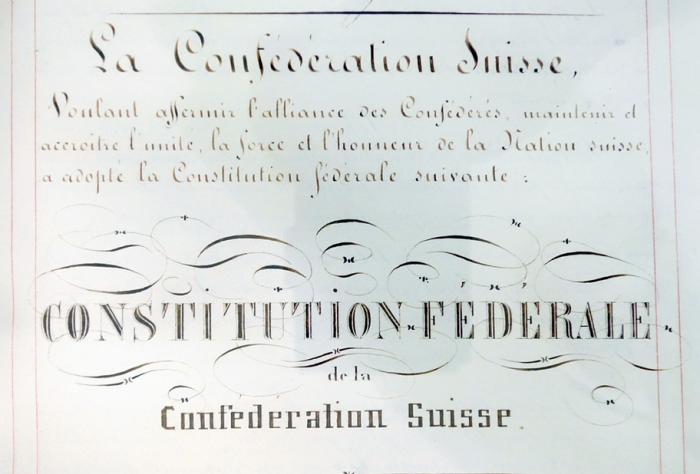Dealing with languages and respecting cultural and linguistic minorities is based on different legal frameworks. The most important reference documents are presented in this category.
Legal basis
December 6, 2016
The Swiss constitution and languages
The Federal Constitution of the Swiss Confederation, the current version of which dates from 1999, forms the basis for plurilingualism with the aim of promoting “the internal cohesion and cultural diversity of the country”. It defines four principles: equal status among languages, citizens’ freedom to use any language, language territoriality and protection of the minority languages. Various Articles in the Constitution involve language policies: for example, Art. 4 “National languages”; Art. 18 “Freedom to use any language” and especially Art. 70 “Languages”; in part Art. 8 “Equality before the law”; Art. 31 “Deprivation of liberty”; Art. 62 “School education”; and Art. 175, which regulates the composition and election of the Federal Council. Read more
December 6, 2016
Languages Act and Ordinance
Switzerland’s Federal Languages Act adopted by the national referendum in 2007 (LangA – Federal Act on National Languages and Understanding between the Linguistic Communities) came into force in 2010. It is supplemented with the ordinance as well as corresponding provisions for application and implementation (LangO – Ordinance on National Languages and Understanding between the Linguistic Communities). The Confederation has thus created a formal basis for legislation based on Articles 4, 18 and 70 of the Constitution which enables it to support linguistic minorities and plurilingual cantons as well as the various organisations, institutions and projects in the area of languages and comprehension. Read more
December 6, 2016
Dispatch on culture 2016-2020 and languages
The “dispatches” are an integral component of the legislative process in Switzerland. They serve to define and establish new strategic axes of federal policy, to explicate the course of action and to comment on legislative texts. The Dispatch on the promotion of culture for 2016-2020 (28 November 2014) contains information on the financial management of the Confederation’s promotion of culture during the corresponding budget period (as an exception, five years instead of four) and, more specifically, the strategic directions with respect to languages. Read more
December 6, 2016
Switzerland, 4 national languages and more …
Not only does Switzerland have three official languages (Italian, German and French) and – with Romansh – four national languages, it also has a considerable number of variants, especially among the Swiss-German dialects. But Switzerland’s linguistic diversity is comprised of many more. Without counting the immigration languages and prevalence of English throughout the country, Switzerland has, apart from its regional languages, also a fifth (non-territorial) language, a fact only a few people are aware of. Although the use of these languages is on the decline, they are a part of Switzerland’s plurilingual landscape and contribute to the enrichment of the nation’s cultural and linguistic diversity. Read more


